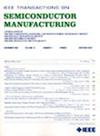A Novel Multi-Modal Learning Approach for Cross-Process Defect Classification in TFT-LCD Array Manufacturing
IF 2.3
3区 工程技术
Q2 ENGINEERING, ELECTRICAL & ELECTRONIC
引用次数: 0
Abstract
In the field of thin-film transistor liquid crystal display (TFT-LCD) manufacturing, the challenge of automated defect classification across multi-layered array processes is profound due to the intricate patterns involved. Traditional deep learning approaches, while promising, often fail to achieve high accuracy in cross-process recognition tasks. To address this gap, we propose a multi-modal learning approach that synergistically combines a knowledge engineering technique called Descriptive Embedding Generation (DEG) with a cross-modal contrastive learning strategy. Unlike conventional methods that primarily rely on visual data, our approach incorporates fine-grained descriptive information generated by DEG, enhancing the discriminative power of the learned model. The performance of this innovative training strategy is demonstrated through rigorous experiments, which show a notable accuracy improvement ranging from 0.92% to 7.89% over existing methods. Our approach has been validated by a leading TFT-LCD manufacturer in Taiwan, confirming its practical relevance and setting a new benchmark in cross-process and multi-product defect classification. This study not only advances the state of defect classification in smart manufacturing but also paves the way for future research in complex recognition tasks.用于 TFT-LCD 阵列制造中跨工序缺陷分类的新型多模式学习方法
在薄膜晶体管液晶显示器(TFT-LCD)制造领域,由于涉及错综复杂的图案,跨多层阵列流程的自动缺陷分类是一项艰巨的挑战。传统的深度学习方法虽然前景广阔,但往往无法在跨工序识别任务中实现高精度。为了弥补这一不足,我们提出了一种多模态学习方法,它将一种称为描述性嵌入生成(DEG)的知识工程技术与一种跨模态对比学习策略协同结合在一起。与主要依赖视觉数据的传统方法不同,我们的方法结合了由 DEG 生成的细粒度描述信息,从而增强了所学模型的判别能力。我们通过严格的实验证明了这种创新训练策略的性能,与现有方法相比,准确率显著提高了 0.92% 到 7.89%。我们的方法已通过台湾一家领先的 TFT-LCD 制造商的验证,证实了其实用性,并为跨流程和多产品缺陷分类树立了新的标杆。这项研究不仅推动了智能制造领域缺陷分类的发展,还为未来复杂识别任务的研究铺平了道路。
本文章由计算机程序翻译,如有差异,请以英文原文为准。
求助全文
约1分钟内获得全文
求助全文
来源期刊

IEEE Transactions on Semiconductor Manufacturing
工程技术-工程:电子与电气
CiteScore
5.20
自引率
11.10%
发文量
101
审稿时长
3.3 months
期刊介绍:
The IEEE Transactions on Semiconductor Manufacturing addresses the challenging problems of manufacturing complex microelectronic components, especially very large scale integrated circuits (VLSI). Manufacturing these products requires precision micropatterning, precise control of materials properties, ultraclean work environments, and complex interactions of chemical, physical, electrical and mechanical processes.
 求助内容:
求助内容: 应助结果提醒方式:
应助结果提醒方式:


